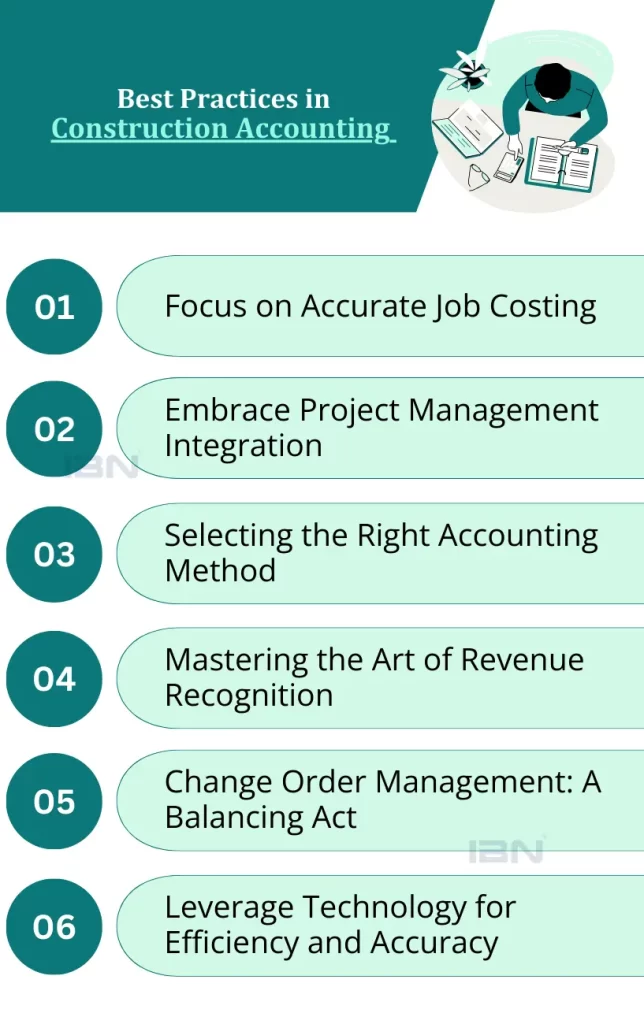Construction Accounting: Tools and Techniques to Optimize Your Financial Operations
Construction Accounting: Tools and Techniques to Optimize Your Financial Operations
Blog Article
Recognizing the Importance of Construction Accounting for Successful Job Administration

Function of Construction Audit
Construction accountancy offers as the backbone of economic management in the construction industry, making certain that projects are finished within budget plan and economic goals are satisfied. construction accounting. This customized accountancy approach addresses the distinct challenges faced in building and construction jobs, consisting of differing task durations, changing costs, and numerous stakeholders
Among the key functions of construction audit is to supply precise cost evaluation and monitoring throughout the project lifecycle. This facilitates enlightened decision-making, making it possible for task managers to readjust timelines and resources successfully. In addition, building bookkeeping improves money circulation administration by monitoring accounts payable and receivable, therefore ensuring that funds are readily available for prompt settlements to providers and subcontractors.
It equips project managers with the required monetary data to prepare detailed economic declarations, which are necessary for audits and financial testimonials. Inevitably, the duty of building and construction accountancy expands beyond plain financial tracking; it is indispensable to strategic preparation and functional effectiveness, driving the success of building and construction tasks in a competitive landscape.
Trick Parts of Building Audit

Budgeting establishes an economic structure that guides job execution, permitting supervisors to assign resources efficiently and prepare for prospective financial difficulties. Accurate expense tracking is essential for tracking costs in real-time, assisting to determine variances between predicted and actual prices. This allows timely changes to maintain the job on budget.
Moreover, monetary reporting provides stakeholders with a clear photo of the project's economic wellness. Normal reports, such as earnings and loss statements and cash circulation analyses, facilitate notified decision-making and boost openness among all events involved.
Furthermore, compliance with sector policies and accountancy standards is critical. This ensures that economic practices are not only efficient but likewise authorized, safeguarding the company versus lawful effects. By incorporating these key parts, building accounting cultivates a structured method to taking care of monetary sources, ultimately contributing to the successful conclusion of building jobs.
Advantages for Task Managers
Leveraging effective construction accounting methods gives job managers with a multitude of benefits that boost both functional performance and monetary oversight. One considerable advantage is improved budget plan monitoring. Exact monitoring of earnings and expenditures permits job managers to keep an eye on economic performance in real time, ensuring tasks remain within budget and facilitating prompt modifications when essential.
Furthermore, building accountancy streamlines capital management, making it possible for task supervisors to expect financial requirements and maximize resource allotment. By understanding cash money inflows and discharges, they can better take care of settlements to providers, subcontractors, and employees, therefore preventing expensive hold-ups.
In addition, durable audit systems offer detailed coverage capabilities. Job supervisors can create reports that use understandings into project productivity, expense differences, and resource use. This data-driven method cultivates informed decision-making, enabling supervisors to identify possible issues proactively and execute rehabilitative steps.
Lastly, adherence to building accountancy criteria makes sure compliance with regulatory and legal demands, lessening the risk of charges or conflicts. Generally, reliable building and construction bookkeeping equips project managers with the tools required to drive job success, enhance stakeholder confidence, and promote lasting organizational growth.
Common Difficulties in Building Accounting
Numerous project other managers come across substantial obstacles in building and construction accounting that can impede task success. Among the main difficulties is the intricacy of tracking multiple job websites, each with distinctive spending plans, timelines, and resource allotments. This requires meticulous attention to information, which can be frustrating without a robust bookkeeping system in position.
Additionally, changing material expenses and labor rates can complicate budget monitoring, making accurate forecasting hard. Job managers typically battle to integrate these expenses with actual expenses, bring about potential financial inconsistencies.
Moreover, building and construction bookkeeping entails conformity with different regulations, including tax commitments and labor legislations. Navigating these policies can be overwhelming, specifically for managers that may not have a strong accounting history.
Another considerable difficulty is handling cash money flow, which is essential in the building and construction market. Hold-ups in invoicing, repayments from customers, or unanticipated task modifications can create capital shortages, threatening the project's progression.
Lastly, efficient communication between task managers, accounting professionals, index and field teams is vital. Misconceptions can cause imprecise monetary coverage, even more making complex project administration initiatives. Addressing these difficulties proactively is important for effective building and construction bookkeeping.

Ideal Practices for Effective Accounting
While navigating the intricacies of building and construction bookkeeping can be difficult, embracing best practices can dramatically improve monetary administration and project success. One fundamental technique is preserving timely and accurate documents. Carrying out durable accountancy software program tailored to building tasks can improve data entry, invoicing, and coverage, reducing mistakes and conserving time.
In addition, developing a clear budget plan and regular monitoring against this budget are critical. Utilizing a system of periodic economic testimonials permits job managers to recognize variations early, assisting in timely decision-making. It is also vital to separate project costs right into indirect and straight categories, enabling more clear insights right into success.
Another ideal method involves promoting open interaction among all stakeholders. Regular updates and joint discussions regarding financial condition can guarantee everyone is lined up and educated. Training personnel in construction-specific accountancy principles better enhances proficiency and precision.
Last but not least, ensuring compliance with pertinent accounting criteria and guidelines is non-negotiable. Normal audits and internal evaluations add to transparency and liability, constructing count on with customers and stakeholders. By concentrating on these finest practices, construction firms can enhance their accounting procedures, eventually driving project success and monetary security.
Conclusion
In final thought, building and construction audit plays a pivotal function in ensuring successful job administration by promoting exact financial oversight and enhancing decision-making. By integrating essential elements such as expense evaluation, cash flow management, and conformity, job managers can navigate common challenges and utilize best methods for effective bookkeeping. Eventually, a robust building bookkeeping framework not only safeguards budget honesty but also adds to the total economic health of construction tasks, fostering sustainable success within the industry.
By incorporating these vital parts, building and this page construction accountancy cultivates a structured strategy to taking care of monetary resources, eventually adding to the successful completion of building and construction tasks.
Accurate monitoring of incomes and expenses allows task managers to monitor economic performance in genuine time, making sure projects continue to be within budget plan and helping with prompt modifications when required.
Task managers can produce reports that supply understandings into task productivity, price variations, and source use.Many project managers come across significant obstacles in construction bookkeeping that can hinder job success. construction accounting. Inevitably, a robust building bookkeeping framework not only safeguards budget stability however also adds to the general economic health and wellness of building and construction projects, cultivating sustainable success within the industry
Report this page